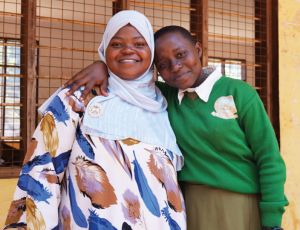
When she thrives, we all thrive
Together this giving season, we can make a difference that ripples outward to benefit everyone.


Prepared by the Research for Equitable Access and Learning (REAL) Centre at the University of Cambridge, the paper addresses the urgent need to identify ways in which high-level political leadership can be mobilized to generate concrete, sustainable and effective actions that deliver quality education for girls. The REAL Centre reviewed global evidence, including from CAMFED’s program.
I experienced [the power of girls’ education] myself as an individual, as a student, then as a teacher and a headteacher. This gave an opportunity for me to be part of that process that will bring about change.
Barbara Chilangwa, CAMFED Executive Advisor and Former Permanent Secretary for Education, Zambia, quoted in the report and policy note
The research, published as Ministers convene for the 43rd session of the Human Rights Council in Geneva, is part of the Leave No Girl Behind Campaign – a global call to action for 12 years of quality education for all girls, especially the most marginalized.
With the turn of 2020 setting the clock ticking on the 10-year countdown to achieve the 2030 Sustainable Development Goals (SDGs), including SDG4 (quality education for all) and SDG5 (gender equality), the release of this policy note is a timely reminder of the world’s promise to deliver on every girl’s right to quality education.
The report identifies some of the roles that key stakeholders, including organizations like CAMFED — a founding member and partner of UNGEI — play in order to influence political leadership for girls’ education:
1. Supporting national leaders to enact legislation, policies and programs for gender equality in education;
2. Ensuring that national leaders develop appropriate policies that align with the needs of the community;
3. Supporting the effective implementation of policies for girls’ education;
4. Supporting government partners to ensure sustainability of reforms beyond election cycles;
5. Supporting high-level political commitment to achieve widespread and sustained social norm change and tackle gender-based discrimination.
It starts with educating a girl, and hopefully ends with a woman leader.
Julia Gillard, CAMFED Patron and 27th Prime Minister of Australia, quoted in the report and policy note
CAMFED takes a two pronged approach: building momentum through grassroots diplomacy and leadership driven by the young women leaders educated with CAMFED support (members of the CAMFED Association), and working constructively with partner governments to ensure that child protection and safeguarding, as well as best practice in delivering quality education, are enshrined in national policy. More than 150,000 members of the CAMFED Association are now providing a benchmark for the impact of young women — once among the most marginalized girls in their communities — who use their expertise, and rally community members, to provide a holistic support network around the most vulnerable, breaking down the obstacles that keep girls out of school, and stop them from learning when they get there.
H. Thomad Blum $26.6
Richard Price $200
Walter Greene $13
Carol Barron $158
Peter Weckesser $106
Kathryn Burns $26.6
Gretchen Bartlett $106
Albert Shen $104.5
Ikisha Dogra $316
Steven Stoppkotte $250
Debbie Kallmbah $5.6
David Holmes $50
jane harper $100
Jonathan Mann $47.6
Jim Reichardt $10.9